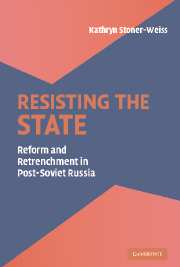Book contents
- Frontmatter
- Contents
- Acknowledgments
- Note on Transliteration
- Resisting the State
- 1 W(h)ither the Russian State?
- 2 Apparatchiki into “Entrepreneurchiki”: The Sources of Russia's Weak Central State
- 3 Governing Russia: Patterns of Regional Resistance to the Central State
- 4 Inside the Russian State: Assessing Infrastructural Power in the Provinces
- 5 Retrenchment over Reform: Obstacles to the Central State in the Periphery
- 6 Weak National Parties, Weak Central State
- 7 The Comparative Implications of Russia's Weak State Syndrome
- Index
7 - The Comparative Implications of Russia's Weak State Syndrome
Published online by Cambridge University Press: 25 July 2009
- Frontmatter
- Contents
- Acknowledgments
- Note on Transliteration
- Resisting the State
- 1 W(h)ither the Russian State?
- 2 Apparatchiki into “Entrepreneurchiki”: The Sources of Russia's Weak Central State
- 3 Governing Russia: Patterns of Regional Resistance to the Central State
- 4 Inside the Russian State: Assessing Infrastructural Power in the Provinces
- 5 Retrenchment over Reform: Obstacles to the Central State in the Periphery
- 6 Weak National Parties, Weak Central State
- 7 The Comparative Implications of Russia's Weak State Syndrome
- Index
Summary
Recognizing the depth and serious threat that regional recalcitrance presented to the success of Russian economic development, almost immediately after his May 2000 inauguration President Putin moved swiftly to address provincial challenges to central authority. Vowing to reestablish and reassert the strength of the Russian state and the “vertical” chain of authority from center to periphery in particular, Putin launched a multi-front war on regional resistance to the Kremlin. This effort culminated in his decision (and the Duma's quick ratification of this proposal) to eliminate competitive elections for regional governors entirely by February 2005. As noted earlier, this was done in the immediate wake of the Beslan school hostage-taking tragedy in the fall of 2004 (where he blamed, with little evidence, regional officials for a botched rescue attempt). This was, presumably, merely a pretext for cracking down harder on regional officials who had long thwarted federal policy. This dramatic measure also amounted to an admission of the failure of previous efforts to gain control over policy in the provinces.
But just as President Yeltsin, in the absence of strong, competitive political institutions, built an unconsolidated Russian democracy with limited accountability of elected officials, Putin's solutions to Russia's regional problem amount to an attempt to build authoritarianism lacking an authoritative state – authoritarianism without authority. That is, although Putin correctly identified the danger of regional resistance to central authority in rebuilding the Russian state as an effective policymaking and policy-implementing device, he offered incomplete and perhaps ultimately ineffective solutions unlikely to break the powerful business–government nexus in the provinces.
- Type
- Chapter
- Information
- Resisting the StateReform and Retrenchment in Post-Soviet Russia, pp. 147 - 160Publisher: Cambridge University PressPrint publication year: 2006



